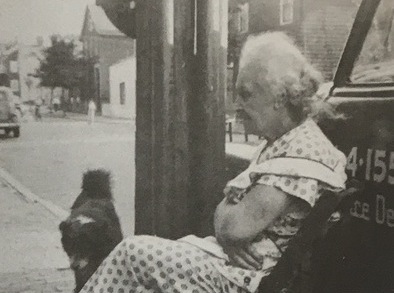One of ten children, Lena Scolles was born in 1910 in East Cambridge to Italian immigrant parents. Her father, who worked as a polisher at Johnson Marble Company, died in his fifties. In this passage she describes her and her mother’s work to support the family, showing how important credit was in ethnic communities. But she also remembers her own efforts to resist parental control over her wages and her choice of a husband.

“I was born at 26 Winter Street [in East Cambridge]. My mother had nine girls and one boy. It was not an easy life. My mother had a grocery store in the front part of the basement of our house. The kitchen was right off the store. She kept a book [the cuff list]. As we grew older, we listened to different things the customers said to my mother. ‘Mrs. Scolles, you’re charging an awful lot for a certain thing,’ whether it was a box of crackers or whatever. ‘We can get it cheaper at the First National right up Cambridge Street, you know.’ I listened to that so many times that one day I said, ‘Look, my mother has to wait a whole week for you to pay this bill, and you’ve got the nerve to ask her why she doesn’t charge what the National does. Try going up to the National now. You’ll find it closed.’ It was closed at six o’clock, and my mother was open until ten o’clock. She’d open sometimes at 6 am because they’d want to come down and get milk and bread for the kids….
“When my future husband Charles first looked at me, he had no eyes for anyone else after that. My father wouldn’t let us out on a first date. I said to my mother, ‘ Ma, you know him,’ She said, ‘You can’t go, you didn’t tell your father he is a night watchman.’ The next time Charles asked me, I didn’t tell my mother, and I snuck out. My sister told me that when she went with my brother-in-law, my mother said, ‘You’re not going with him, you’re going to marry him.’ I said, “Well, you kind of liked him, didn’t you, Mary?’ ‘Yeah, I did,’ she said, “but what if I didn’t?’ I said, ‘I want to see if I like this person enough to be with him before I do anything like that.’ My father went all the way to the West and North Ends of Boston to find out about Charles’s family. He was satisfied to learn that Charles came from a good family. That’s how I was able to go out with him. We had a courtship for three years, off and on, but I couldn’t go out alone. He would come to my mother’s. After the first year, he gave me a friendship ring, and then I was able to go out to the movies. We went to see The Big Parade, starring Rena Dory and John Gilbert, at the Loew’s State Theatre in Boston. I’ll never forget it.
“I was fourteen, and I don’t think I finished the first year in the high school, and I had to leave and go to work. Then I had continuation school, a half a day a week, and I went back to high school at night. I graduated from there. It was hard, but my mother had it rough. My father was very sick. He was only fifty-four when we lost him. That left my mother with all us girls and one boy. I went to work to pay a macaroni bill that my mother owed in the store. I worked at Prince Spaghetti on Commercial Street in Boston. I did most everything: I packed, and I ran a box-making machine. I got tired of them taking my pay and not giving me anything. Finally, one day I told my foreman, ‘Look, Mr. Murphy, I’m tired of signing my check over and giving it to you. You should at least have the decency of letting me take my check home and be able to take the money to my mother in the store.’ But it didn’t go that way. I didn’t want to hurt my mother either. That’s the way it was.”
From: Sarah Boyer, All in the Same Boat: Twentieth Century Stories of East Cambridge (Cambridge Historical Commission, 2005), 51-52.

